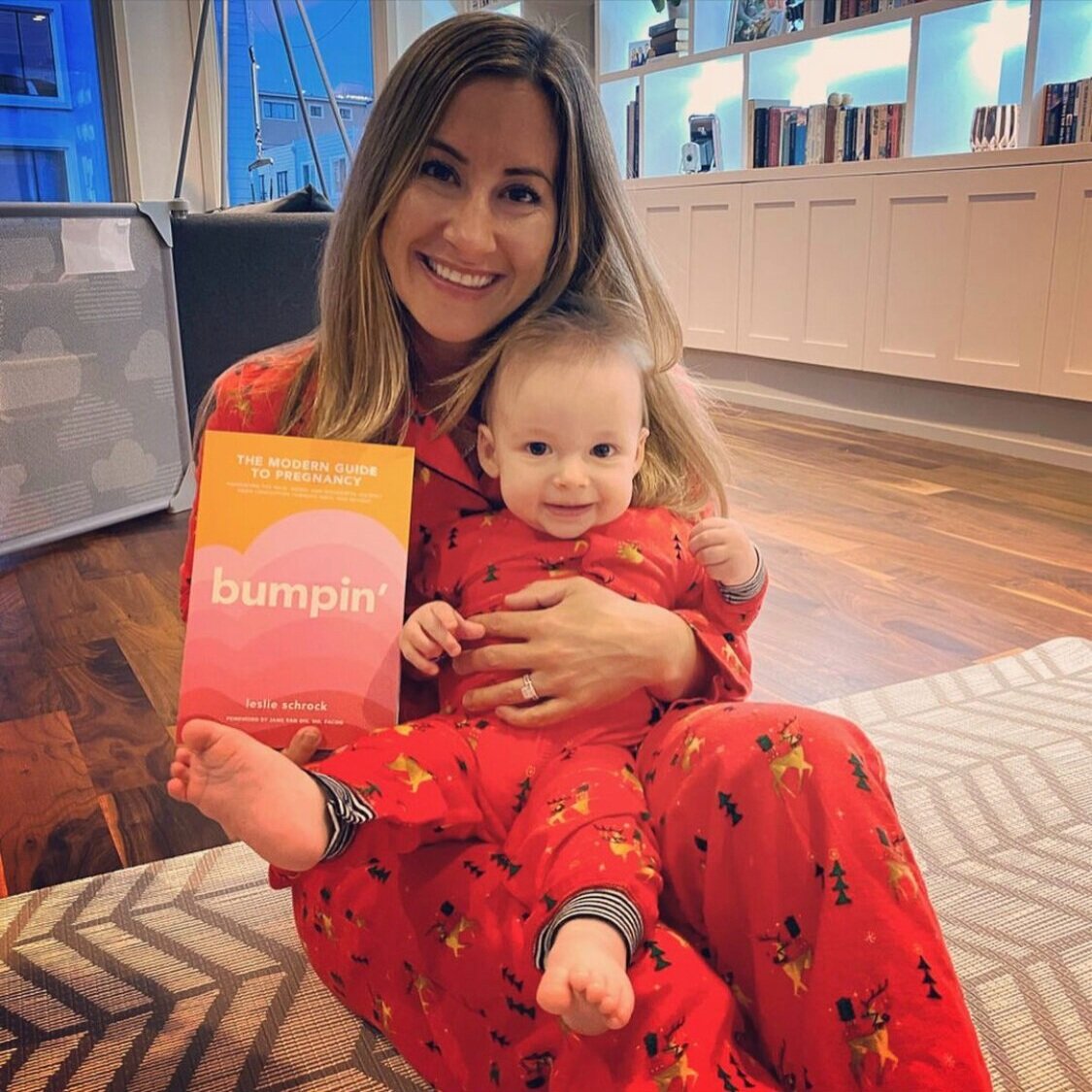Episode 61: Leslie Schrock
In this episode, Leslie covers:
🔹why she’s not a fan of birth plans
🔹medicated and non-medicated pain management
🔹how a barber’s comb became an effective pain reliever for Leslie
🔹benefits of a having doula and how to choose one
🔹how Leslie successfully reframed her fear of vaginal tearing (this technique will make you smile)
🔹the most helpful thing Leslie did during pregnancy to prepare for birth
🔹what she wished she’d known before her birth experiences
🔹the difference between Braxton Hicks and labor contractions
🔹how you’ll know when the baby is coming
🔹when to go to hospital
🔹back labor - what is it?
🔹handling the unpredictable
‘My vagina is huge!’
Leslie Schrock is just as candid and straight-talking in real life as she is in her book, ‘Bumpin’ - The Modern Guide To Pregnancy’.
The entrepreneur, investor, and now mother of two, wrote the book - which has been described as the 'new pregnancy bible' - while she was pregnant with her son TJ. Leslie had suffered several complicated pregnancies and losses, leaving her feeling confused and helpless, so she wrote the guidebook she wished she’d had from conception all the way through to postpartum.
Leslie wrote Bumpin’ while pregnant with her son TJ
Leslie, who had worked for more than a decade at the intersection of health and technology (she was named one of Fast Company’s Most Creative People in Business), interviewed a range of experts for her book research. But even with the depth of knowledge and expertise she gained, she still faced two difficult and unpredictable birth experiences.
“I am living proof that you can do everything, know everything, have all of the access in the world and stuff just does not always go the way you want,“ she told me in healthHackers® episode 61.
With Dylan, her second son, following a C-section
So how does Leslie recommend you prepare for your baby’s delivery, knowing that things may not pan out how you want them to? For starters, don’t write a birth “plan”.
“The word ‘plan’ indicates that you have ultimate control over this process, which, as someone who has been pregnant five times and who has given birth twice, I can tell you that even if you have a textbook boring birth (which hopefully you will), something inevitably will not go the way that you expect,” she told me.
Instead, Leslie suggests having a list of birth ‘preferences’ and keeping “the idea in the back of your head… that you are not in full control of what happens during birth.”
“I think one of the things that we have really done to women that has become a great disservice is telling them that you can just will your way through this and compel your baby to do the thing that you want it to do,“ she told me.
One of Leslie’s own preparation steps was hiring a birth doula. If you’ve never heard of a doula, consider them private birth support - a bit like having a personal coach for The Big Event.
Leslie suggests having a list of birth “preferences”
“I want to take a moment and plug doulas - they're incredible. You can think of a doctor or a midwife as someone who takes care of you from the waist-down. Doulas take care of you from the waist-up. They take care of your mind,” she told me.
Their support could have a key impact on your birth experience. “Research bears out that having a doula at your birth means that you will have less interventions and less pain management,” Leslie said.
It was Leslie’s doula who taught her a game-changing technique to quell her fear of vaginal tearing. She asked her to close her eyes, breathe and then said…
“‘I want you to imagine your vagina just opening up. Your vagina is the size of the Universe. And I want you to just say to yourself, ‘My vagina is huge’. And that is what I thought to myself the entire time I was in labor, and it really helped,“ Leslie told me.
In healthHackers® episode 61, Leslie also discusses pain relief; medicated and unmedicated. An epidural is one of the best-known options. Leslie said she finds most women don’t know if they want one or not.
“Doulas take care of you from the waist-up. They take care of your mind,” Leslie told me
“I think a lot of the time it is made out to be… ‘taking the easy way out’ or something. And I'm here to tell you after having been in unmedicated back labor for 12 hours, and then getting an epidural because I had to, I ended up with two c sections because I have a very crappy uterus as it turns out.
“I don't see it [getting an epidural] as taking the easy way out. And I think for a lot of people, it's absolutely the right decision.”
As far as non-medicated options go, watch episode 61 to discover how a simple comb served as an effective pain relief tool for Leslie.
“It absolutely worked for me. I've actually bequeathed that comb to several friends who have used it during their own labors,” she said.
Plus, we touch on hydrotherapy, hypnobirthing, birthing balls and acupuncture.
“Acupuncture is, in my opinion, a really phenomenal tool certainly in the months leading up to birth. I think it's a really powerful tool in the postpartum period as well. A lot of people are haters about acupuncture. I get feedback about this all the time,” she told me.
“There have been a lot of clinical studies that show that it can help with pain management,” Leslie said, adding: “One of the best benefits of acupuncture is that it reduces your cortisol levels.”
I asked Leslie about her two difficult births. “I did not go into labor on my own with TJ. I had to be induced. From the time my water broke to the time he was pulled out, it was about 65 hours. I was in unmedicated back labor for about 12 hours of that, I think. It was the worst pain I've ever been in in my life.”
TJ had become stuck in the birth canal and a C-section was essential.
“There was always a little voice in the back of my head that said ‘You know what, you're not in control here. You've got to just kind of be okay with it,” she said.
Leslie’s second birth experience involved another C-section, and then some sad news for her.
Picture: leslieschrock.com
“I found out after Dylan was born that I can't have more children. I almost had to have a hysterectomy with this birth because my uterus wouldn't contract,” she told me. “I was kind of done anyway. But that was hard. That was really hard.”
Now with her two happy and healthy boys, Leslie outlined ways in which she was able to deal with all that she had suffered. “I got therapy after my miscarriages. I think it's such a powerful tool. But I also made it a goal to just be really honest with everyone in my life about how I was doing.”
Ultimately, it’s acceptance and wisdom that chimes through when Leslie talks about her experiences and birth preparation tips in episode 61. As she so wisely puts it: “You only have so much control.”
Leslie has worked for more than a decade at the intersection of health and technology
Follow Leslie on Instagram, Twitter and check out her website.
Thank you to the sponsors of this episode: GlycanAge. See my review of the GlycanAge biological “true age” test and get details of your 15% discount here.
Common sense caution: Anything you hear or see within healthHackers® content should not be considered personal or medical advice. You’ve heard it before, you know the score - always talk to your own health provider about your concerns.







